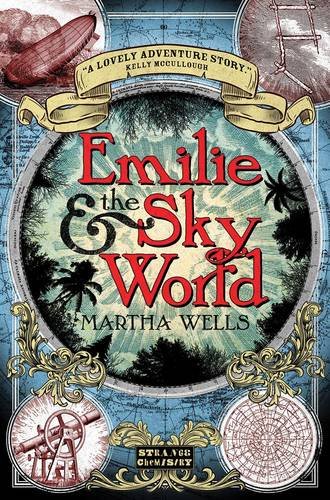
![]() Emilie & the Hollow World by Martha Wells
Emilie & the Hollow World by Martha Wells
Emilie & the Hollow World, by Martha Wells, has an immediately endearing title (I’m a big fan of hollow world stories), which it doesn’t quite live up to. It’s a solid enough story, though, if not particularly distinctive.
The novel opens with sixteen-year-old Emilie running away from her uncle’s home and trying to slip aboard the local ferry. Things go awry and instead she’s forced to swim to another nearby ship to hide from the dock guards. Turns out it just isn’t Emilie’s night, however, for soon the ship she’s crawled up on is under attack and she quickly finds herself dodging bullets, meeting a not-at-all human-person, and then traveling the “aether current” into the world at the center of our own. Soon, she learns she’s now an involuntary part of a rescue party/scientific expedition whose members include Lord Engal, Vale Marlende (her father is the aether scientist/sorcerer whose earlier expedition was lost), and Kenar (the strange-looking man whose home is in the Center of the Earth and who came to our world seeking help).
Arriving in the Hollow World, the group soon faces technical problems that may prevent them from getting home, making finding Vale’s father all the more important as only he may be able to repair their ship. Their search leads Emilie into many adventures where her courage, empathy, and resourcefulness are greatly tested.
The positives are many. Emilie & the Hollow World is a light, quick read with a likable, “plucky” main character thrown into a series of fast-paced adventures nicely separated by quieter moments. The prose is efficient and carries you smoothly through the story. The main obstacle to their goals — a decaying ancient empire of merpeople embroiled in a civil war — is intriguing and the glimpses we see of its cities and social structure are well done and leave the reader wanting more. All of these, as mentioned, make for a solidly entertaining tale.
 There is, however, a richness and sense of depth and vividness missing from Emilie & the Hollow World that would have made it more than solidly entertaining. Characterization is thin across the board, even for our main character. We’re given the backstory of why Emilie is running away, but it never feels embedded in her character; it simply feels like a quick device to get her into her adventure. She finds her inner resourcefulness and bravery as she faces danger after danger, the narrator oftentimes telling us as she does so (“She couldn’t believe she had done it”), but from the very start there was little belief she wouldn’t and so this doesn’t feel much like growth or change in her character. I also felt that my perception of her age was all over the place; sometimes she sounded/felt like she was much younger than her sixteen years of age, more like a 12-13-year-old, and other times she felt/sounded much older, as if she were more in her late 20’s.
There is, however, a richness and sense of depth and vividness missing from Emilie & the Hollow World that would have made it more than solidly entertaining. Characterization is thin across the board, even for our main character. We’re given the backstory of why Emilie is running away, but it never feels embedded in her character; it simply feels like a quick device to get her into her adventure. She finds her inner resourcefulness and bravery as she faces danger after danger, the narrator oftentimes telling us as she does so (“She couldn’t believe she had done it”), but from the very start there was little belief she wouldn’t and so this doesn’t feel much like growth or change in her character. I also felt that my perception of her age was all over the place; sometimes she sounded/felt like she was much younger than her sixteen years of age, more like a 12-13-year-old, and other times she felt/sounded much older, as if she were more in her late 20’s.
The merfolk empire is intriguing, as mentioned, but thin, and interactions with them feel very perfunctory, and one never gets a sense of danger (or sometimes even competency) from them. The other major adversary, a rival Lord named Ivers, is pretty stereotypical and that storyline is quite predictable, especially the “surprise” at the end. The larger world — the Hollow World, Emilie’s world, the use of magic mixed with science — feels as thin as the characterization. Some might call it streamlined, or prefer (especially with YA) an author who uses a “light” hand in this regard, but I wanted much more all around; I wanted a more vivid, richer, more immersive experience. For that reason, I’d place this definitely in the YA category (as opposed to a more crossover type of reading experience) and also say that the younger range of YA would probably enjoy it more than the older readers.
Emilie & the Hollow World ends with resolution of the main storyline, but also clearly leaves room for further adventures for Emilie with at least some of her compatriots. This was a quick enough, entertaining enough read that I’d pick up a second, but with hopes that the plot and character both deepen beyond this relatively plain and simple introduction.



I’ve been hearing a lot of similar reactions about this novel, which is kind of a shame because I’ve really enjoyed what I’ve read of Wells so far. I’m still going to read it eventually and see what my own opinions end up as, but so far it seems like there’s a general consensus that this one didn’t live up to expectations.